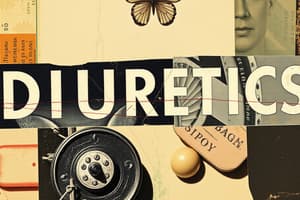Podcast
Questions and Answers
Where does about 65% of sodium get reabsorbed?
Where does about 65% of sodium get reabsorbed?
- Afferent Arteriole
- Distal Tubule
- Proximal Convoluted Tubule (correct)
- Loop of Henle
Which part of the nephron primarily reabsorbs water, concentrating the urine?
Which part of the nephron primarily reabsorbs water, concentrating the urine?
- Loop of Henle (correct)
- Afferent Arteriole
- Distal Tubule
- Proximal Convoluted Tubule
Where do loop diuretics primarily act to promote diuresis?
Where do loop diuretics primarily act to promote diuresis?
- Distal Tubule
- Proximal Convoluted Tubule
- Afferent Arteriole
- Loop of Henle (correct)
What is the primary mechanism of action of thiazide diuretics?
What is the primary mechanism of action of thiazide diuretics?
What is the role of osmotic diuretics in preventing water reabsorption?
What is the role of osmotic diuretics in preventing water reabsorption?
What is the function of afferent arteriole in the nephron?
What is the function of afferent arteriole in the nephron?
What is the primary mechanism of action of carbonic anhydrase inhibitors like acetazolamide in the body?
What is the primary mechanism of action of carbonic anhydrase inhibitors like acetazolamide in the body?
Which of the following conditions is NOT commonly treated with acetazolamide?
Which of the following conditions is NOT commonly treated with acetazolamide?
What is the significant effect of acetazolamide on erythrocytes?
What is the significant effect of acetazolamide on erythrocytes?
Which of the following is an off-label use of acetazolamide?
Which of the following is an off-label use of acetazolamide?
What is the primary action of carbonic anhydrase inhibitors on blood vessels?
What is the primary action of carbonic anhydrase inhibitors on blood vessels?
Which kidney stone type is most commonly treated with acetazolamide?
Which kidney stone type is most commonly treated with acetazolamide?
Flashcards are hidden until you start studying




